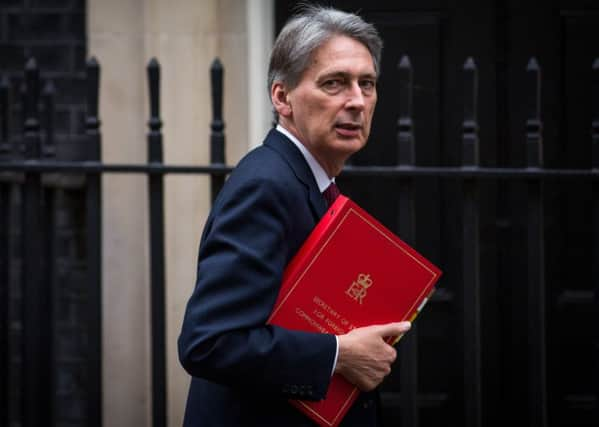Philip Hammond: IndyRef2 bigger threat to Scots economy than Brexit


After delivering his Autumn Statement, Philip Hammond said “survey after survey” had shown that businesses in Scotland were more concerned about the prospect of a re-run of 2014’s vote than the possible impact of the UK leaving the EU.
The Chancellor attacked the SNP after delivering his first set of spending plans, which will see the Scottish Government handed £800m over the next five years as a result of major infrastructure spending in the rest of the UK.
Advertisement
Hide AdAdvertisement
Hide AdHe also announced that talks will begin on City Deals for Stirling, Perth and Dundee – meaning that every city in Scotland is now in the process of negotiating its own potentially lucrative investment agreement.
The Chancellor only made a brief reference to Brexit in his Autumn Statement, prompting the SNP’s economy spokesman Stewart Hosie to describe it as the “elephant in the room” and accuse him of trying to avoid the issue.
However, Mr Hammond responded by saying that the SNP knew “very well” that the threat of a second independence referendum was “bigger than concerns about possible future Brexit arrangements”.
He said: “The biggest drag on growth in Scotland, survey after survey shows, the biggest drag on business investment is the continuing threat of a second referendum.”
Advertisement
Hide AdAdvertisement
Hide AdThe day after the Brexit vote in June, Scottish First Minister Nicola Sturgeon said a second independence referendum was “highly likely” as Scots faced being forced out of the EU despite 62 per cent of people voting to remain.
However, last month members of the Royal Institution of Chartered Surveyors blamed recent a fall in demand for commercial property on the threat of a second independence referendum, saying this was having a “more detrimental effect” on the market than Brexit. Ruth Davidson, the leader of the Scottish Conservatives, also accused Ms Sturgeon of spending her time since the Brexit vote “thrashing around trying to manufacture an argument for independence, while dithering over the day job”.
She added: “We face enough headwinds in future without having to worry about the extra uncertainty posed by her unwanted independence referendum campaign.”
Mr Hammond said it was clear that Scotland’s productivity “needs attention” and called on the SNP to use the £800m of additional funding provided by the UK Government in the Autumn Statement to improve its economic performance. Attention will now turn to the Scottish Government’s spending plans, which are due to be published by Finance Secretary Derek Mackay on 15 December.
Advertisement
Hide AdAdvertisement
Hide AdThe SNP are likely to come under pressure from Labour to increase taxes to fund public services.
Criticising Mr Hammond’s approach, Mr Mackay said his budget would “support our economy, tackle inequality and provide high quality public services for all – underlining the very different approaches our two governments take”.
He also described the Autumn Statement as “a massive missed opportunity to end austerity”, adding: “The Chancellor has failed to ease the punitive cuts that are hitting so many Scottish families.
“Instead he has continued the damaging austerity that is slashing the budget for public services.”
This story first appeared on our sister site iNews
